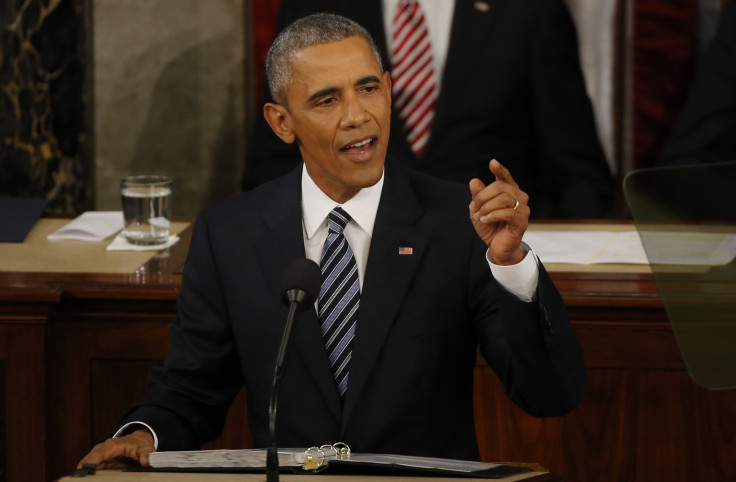Black Lives Matter? Not For Obama During State Of The Union Speech

President Barack Obama gave a soaring State of the Union address Tuesday night, full of ideas about America’s future and rhetoric about including everyone in the vision of what he wants his country to be. He discussed everything from climate change to immigration to the country’s economy, but one topic that Obama largely avoided was criminal justice reform.
The president mentioned the country’s justice system early in his speech in a sentence about bipartisan priorities, but did not elaborate on the topic as he did on many others. “I hope we can work together this year on bipartisan priorities like criminal justice reform, and helping people who are battling prescription drug abuse. We just might surprise the cynics again,” Obama said.
On the 2016 campaign trail, all three Democratic presidential candidates have put forth platforms for how they would overhaul America’s criminal justice system, and they have often talked about reducing the incarceration rates as well as increasing oversight of the nation’s police forces. The high number of civilian deaths at the hands of police officers in the past few years has caught the attention of activists and the media, with the Black Lives Matter social justice movement gaining prominence and seeking to influence policy.
Obama finished his last #SOTU without a mention of abortion, #reprorights, or #BlackLivesMatter. So disappointed. pic.twitter.com/SHNLzTfRZ7
— Renee Bracey Sherman (@RBraceySherman) January 13, 2016One of the Black Lives Matter movement’s founders, Alicia Garcia, was in the audience for Obama’s speech Tuesday night as a guest of Rep. Barbara Lee of California. Last year, activists often interrupted politicians’ speeches to ask them about the movements’ concerns.
In the past, Obama has defended the movement, saying their protests are giving a voice to issues in the African-American community. “We, as a society, particularly given our history, have to take this seriously,” the president said in October, CBS News reported.
On Tuesday, Obama not only left out Black Lives Matter, but he also did not talk much about gun violence in general, despite announcing executive actions on gun control just last week. After the announcement of his executive actions, Obama hosted a town hall last week to talk about guns, where he dealt with tough questions from citizens who wanted to understand his proposals and challenge his views on gun ownership in America.
The only mention of guns in his State of the Union was, again, among a list of priorities for the coming year. “I’ll keep pushing for progress on the work that still needs doing. Fixing a broken immigration system. Protecting our kids from gun violence. Equal pay for equal work, paid leave, raising the minimum wage,” Obama said.
Disappointing that two HUGE priorities were not discussed w/ detail: criminal justice reform & immigration reform. #SOTU
— Linda Sarsour (@lsarsour) January 13, 2016Before his speech, members of the Congressional Black Caucus had said they hoped the president took the opportunity to address issues of race and inequality, the Washington Post reported.
“I hope that he will acknowledge that this is the civil rights issue for this generation,” Rep. Elijah Cummings said, according to the Washington Post. “The generation that is addressing the Black Lives Matter movement are already in the door, they’re just trying to stay there.”
The closest Obama came to addressing civil rights issues was his discussion of voting rights. He encouraged Americans to participate in the political process and critiqued efforts to prevent people from doing so.
“We have to end the practice of drawing our congressional districts so that politicians can pick their voters, and not the other way around. We have to reduce the influence of money in our politics, so that a handful of families and hidden interests can’t bankroll our elections — and if our existing approach to campaign finance can’t pass muster in the courts, we need to work together to find a real solution,” the president said. “We’ve got to make voting easier, not harder, and modernize it for the way we live now. And over the course of this year, I intend to travel the country to push for reforms that do.”
After discussing the terror threats against America and emphasizing how he has grown the country’s economy, Obama also ended his speech by talking about the importance of accepting all Americans. He still, though, did not delve into details of race relations in the country.
“As frustration grows, there will be voices urging us to fall back into tribes, to scapegoat fellow citizens who don’t look like us, or pray like us, or vote like we do, or share the same background,” he said. “We can’t afford to go down that path. It won’t deliver the economy we want, or the security we want, but most of all, it contradicts everything that makes us the envy of the world.”
© Copyright IBTimes 2024. All rights reserved.






















